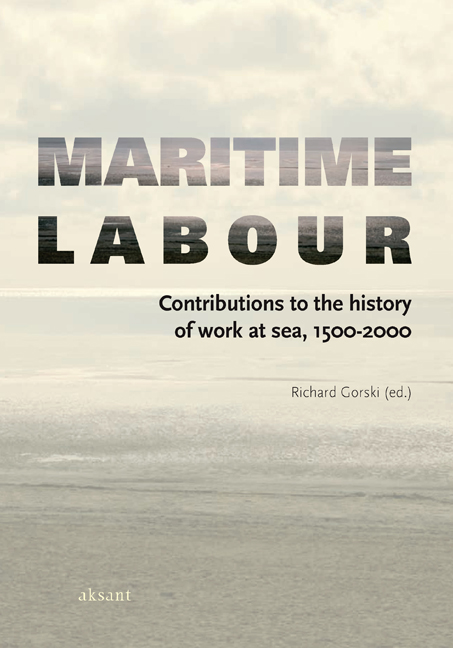Book contents
- Frontmatter
- Contents
- Introduction
- Six Cross-sections of the Dutch Maritime Labour Market: A Preliminary Reconstruction and its Implications (1610-1850)
- On Maritime Labour and Maritime Labour Markets in Germany, 1700-1900
- Swedish Naval Personnel in the Merchant Marine and in Foreign Naval Service in the Eighteenth Century
- Quantifying British Seafarers, 1789-1828
- ‘But for the Loves of the Fishes’: Maritime Labour and Ecological Culture in Nineteenth-century Newfoundland
- The Shipping Federation and the Free Labour Movement: A Comparative Study of Waterfront and Maritime Industrial Relations, c.1889-1891
- Health and Safety Aboard British Merchant Ships: The Case of First Aid Instruction, 1881-1908
- British Merchant Marine Engineer Licensing, 1865-1925
- Transatlantic Fishers: New England and British Trawlermen, 1960-1972
- Masters and chiefs: Enabling globalization, 1975-1995
- About the Contributors
‘But for the Loves of the Fishes’: Maritime Labour and Ecological Culture in Nineteenth-century Newfoundland
Published online by Cambridge University Press: 26 January 2021
- Frontmatter
- Contents
- Introduction
- Six Cross-sections of the Dutch Maritime Labour Market: A Preliminary Reconstruction and its Implications (1610-1850)
- On Maritime Labour and Maritime Labour Markets in Germany, 1700-1900
- Swedish Naval Personnel in the Merchant Marine and in Foreign Naval Service in the Eighteenth Century
- Quantifying British Seafarers, 1789-1828
- ‘But for the Loves of the Fishes’: Maritime Labour and Ecological Culture in Nineteenth-century Newfoundland
- The Shipping Federation and the Free Labour Movement: A Comparative Study of Waterfront and Maritime Industrial Relations, c.1889-1891
- Health and Safety Aboard British Merchant Ships: The Case of First Aid Instruction, 1881-1908
- British Merchant Marine Engineer Licensing, 1865-1925
- Transatlantic Fishers: New England and British Trawlermen, 1960-1972
- Masters and chiefs: Enabling globalization, 1975-1995
- About the Contributors
Summary
Introduction
Over the past twenty years, researchers have emphasized the importance of the early modern capitalist organization of maritime labour, whether in seafaring, fishing, or hunting sea mammals; they depict maritime labourers as either market agents or the vanguard of proletarian resistance to exploitation at sea. Yet works on seafaring in New England and Atlantic Canada suggest that maritime workers often served in paternalistic relationships defined by the bonds of kin and community in the ports from which they sailed. Most seafarers worked for short periods of their lives in deep-sea trades; they otherwise worked in a variety of related trades ashore, or within the context of much more household-like, small-scale production in fisheries or coastal trading, such as in the case of outport Newfoundland. We must pay more attention to the wider culture of such people, which mediated the exchange between their work and capitalist market imperatives and demonstrates that in such an environment, the moral world of preindustrial communities did not simply dissolve in the alienated relationships between labour and capital at sea.
The maritime labourers of Newfoundland worked in an international capitalist economy, but capitalist social relations did not define completely their social, economic, and ecological relationships. In the Newfoundland case, notions of a moral economy, of what comprised ‘fair’ exchange between employers and employed, or between merchants and fishers, emerged in close association with the entrenchment of household production in the outport fishery after 1815. Such concepts persisted through the early twentieth century, and suggest an early sensitivity to the ecological problem of resource depletion associated with more capital-intensive forms of marine-resource harvesting. Not all European settlers on the North Atlantic littoral embraced mechanistic market values and systems of property rights associated with the Scientific Revolution and the maturation of capitalism in Europe by the end of the eighteenth century. The depleted ground fisheries of Atlantic Canada might mislead us with the notion that the history of outport Newfoundland has been that of the unremitting exhaustion of marine resources. However, fishing people expressed ecological concerns by drawing on older Anglo-American understandings about the rights of the commons.
- Type
- Chapter
- Information
- Maritime LabourContributions to the History of Work at Sea, 1500–2000, pp. 105 - 128Publisher: Amsterdam University PressPrint publication year: 2008



